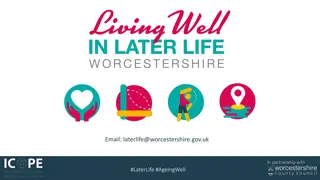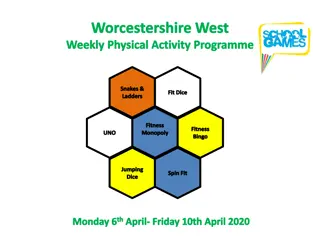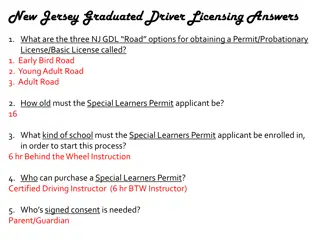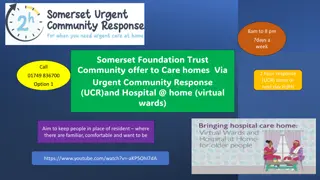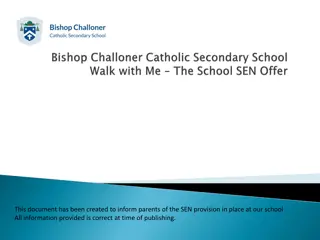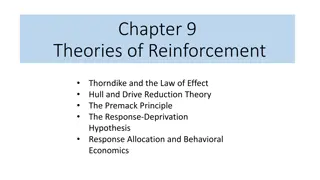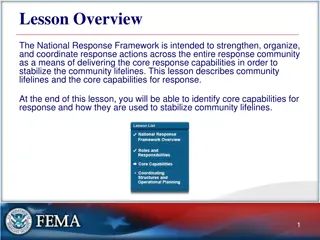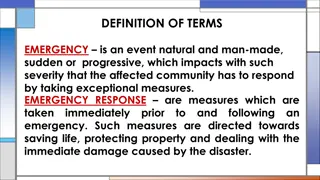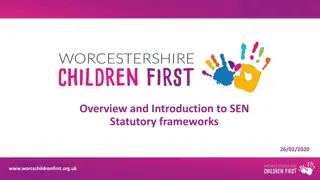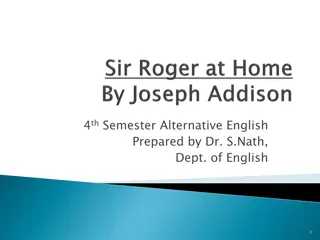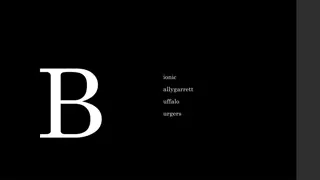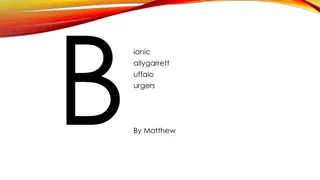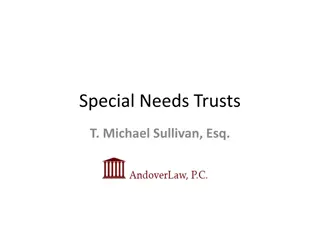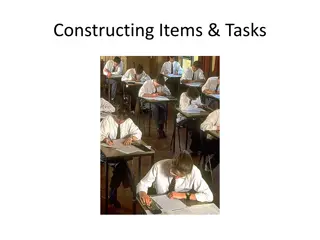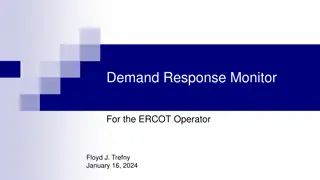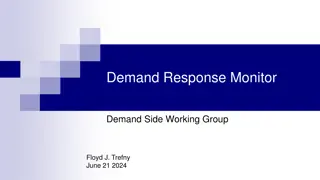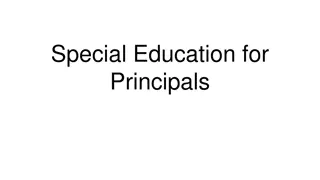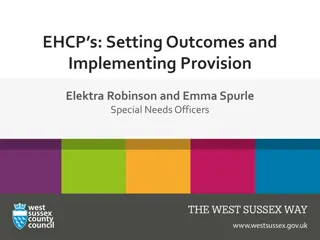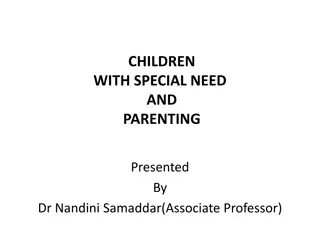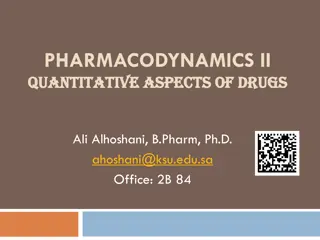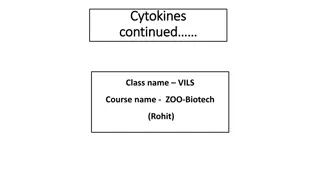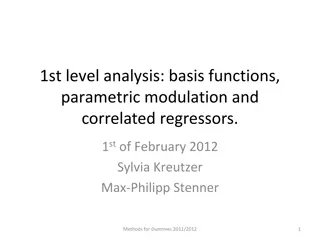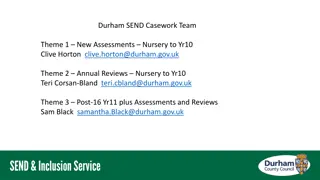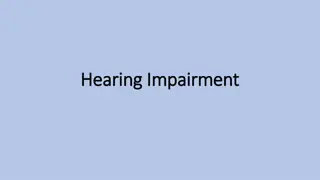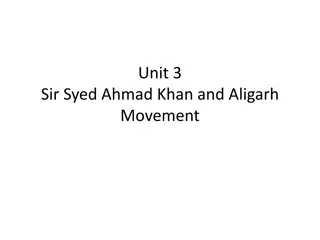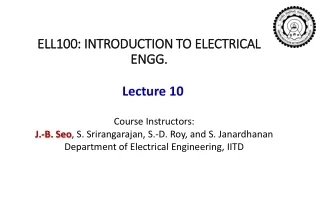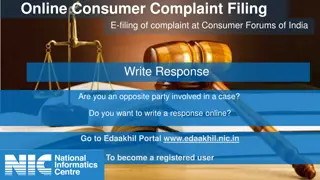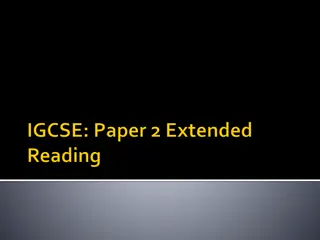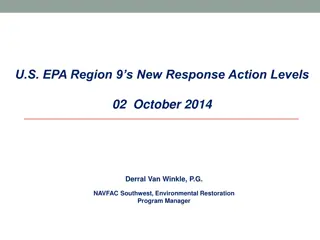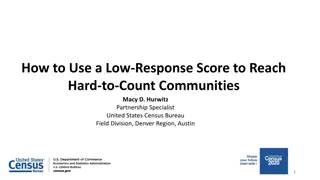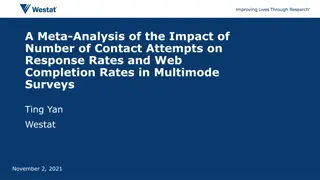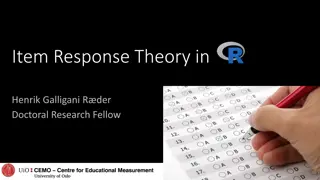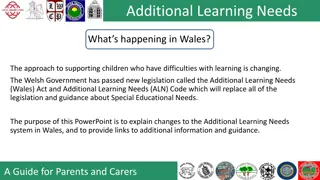Understanding the Graduated Response for Special Educational Needs in Worcestershire
This resource focuses on ensuring staff in educational settings have a secure understanding of the Graduated Response for children with special educational needs. It emphasizes the role of teachers as supporters of all pupils, explores ways to involve parents and children in the support process, and aims for all children to achieve well and lead fulfilled lives. The content covers what happens when a child is not making progress, the involvement needed for additional support, and emphasizes early intervention to secure better progress.
Download Presentation

Please find below an Image/Link to download the presentation.
The content on the website is provided AS IS for your information and personal use only. It may not be sold, licensed, or shared on other websites without obtaining consent from the author. Download presentation by click this link. If you encounter any issues during the download, it is possible that the publisher has removed the file from their server.
E N D
Presentation Transcript
The SEN Graduated Response in Worcestershire www.worcschildrenfirst.org.uk
Aims and Objectives To ensure all staff in educational settings and wider teams working with schools develop a secure understanding of the Graduated Response, with the child and family at the centre. To emphasise the role of class/subject teachers as teachers of all pupils, including those with special educational needs and/or disabilities. To better understand each aspect of the Assess-Plan-Do-Review cycle and roles and responsibilities within this process. To explore effective ways of involving parents/carers and children and young people throughout the support process. www.worcschildrenfirst.org.uk
The Vision for SEND Our vision for children with special educational needs and disabilities is the same as for all children and young people that they achieve well in their early years, at school and in college, and lead happy and fulfilled lives. Foreword from the Parliamentary Under-Secretary of State for Health and the Parliamentary Under-Secretary of State for Children and Families: Special educational needs and disability code of practice: 0 to 25 years January 2015. www.worcschildrenfirst.org.uk
What happens when a child or young person is not making progress? Where a pupil is making less progress than expected, the first response should be high quality teaching targeted at their areas of weakness or difficulty. Where progress continues to be less than expected the class or subject teacher, working with the SENCO, should assess whether the child has SEN. www.worcschildrenfirst.org.uk
What happens when a child or young person is not making progress? (Continued) While informally gathering evidence (including the views of the pupil and their parents/carers) schools should not delay in putting in place extra teaching or other rigorous interventions designed to secure better progress, where required. The pupil s response to such support can help identify their particular needs. www.worcschildrenfirst.org.uk
If a child or young person needs more support, who should be involved? In a school or setting this would be the class/subject teacher, the school s Special Educational Needs Co-ordinator (SENCo), the parents and, where appropriate, the child or young person themselves. If a parent/carer thinks their child or young person needs more support in school the first people they should talk to are the class/subject teacher and SENCo. www.worcschildrenfirst.org.uk
If a child or young person needs more support, who should be involved? (Continued) The SENCo is the person responsible in school for helping to make sure that the needs of the children or young people with SEND are met. They aren t responsible for teaching them, but for giving advice and support. They will be able to say what support is already in place and talk through what should happen next. www.worcschildrenfirst.org.uk
Definition of SEND A pupil has SEN where their learning difficulty or disability calls for special educational provision, namely provision different from or additional to that normally available to pupils of the same age. Children and young people who have SEN may also have a disability under the Equality Act 2010. Where a child or young person is covered by SEN and disability legislation, reasonable adjustments and access arrangementsshould be considered as part of SEN planning and review. www.worcschildrenfirst.org.uk
Areas of Special Educational Need There are four broad areas of need and a child may have needs across some or all of these areas. Their needs can change over time and should inform the level of support they require. 1. Communication and Interaction: Difficulty with speech and language development and/or social communication and interaction. This means the child or young person may have difficulty saying what they want, understanding others and developing relationships. 2. Cognition and Learning: Children or young people have difficulty learning or remembering basic skills. They learn differently from others and may have difficulty with literacy or numeracy or learn at a slower pace. www.worcschildrenfirst.org.uk
Areas of Special Educational Need (Continued) 3. Social, Emotional and Mental Health: Difficulty with managing their emotions and/or social interaction and may be experiencing mental health problems. They may have difficulty making friends or relating to adults. They may be withdrawn, isolated or find controlling their behaviour difficult. 4. Sensory and Physical: Children or young people with visual or hearing impairments or who have physical difficulties which affect their learning. www.worcschildrenfirst.org.uk
Identifying SEN in schools and settings All schools and other educational settings should have a clear approach to identifying and responding to SEN. The benefits of early identification are widely recognised identifying need at the earliest point and then making effective provision improves long-term outcomes for the child or young person. Making high quality teaching ordinarily available to the whole class is likely to mean that fewer pupils will require SEN Support. Such improvements in whole-class provision tend to be more cost effective and sustainable. www.worcschildrenfirst.org.uk
What is the Graduated Response? Where a pupil is identified as having SEN, schools should take action to remove barriers to learning and put effective special educational provision in place. This SEN support should take the form of a four-part cycle (assess, plan, do, review) through which earlier decisions and actions are revisited, refined, refreshed and revised with a growing understanding of the pupil s needs and of what supports the pupil in making good progress and securing good outcomes. This is known as the Graduated Response. It draws on more detailed approaches, more frequent reviews and increasingly specialist expertise in successive cycles in order to match interventions to the SEN of children and young people. (CoP Para 6.44) www.worcschildrenfirst.org.uk
The Graduated Response in Worcestershire Worcestershire has produced a local guide to improving outcomes for children and young people with SEND. It is a toolkit for schools and Early Years settings to use when looking at the support which can be put in place to help their pupils with SEND. Further guidance has been produced to provide parents, families, school staff and agencies working with schools to enable them to gain a better understanding of the Graduated Response and what this will look like within educational settings. www.worcschildrenfirst.org.uk
The Graduated Response - SEN support The Graduated Response can encompass an array of strategies which are underpinned by a number of central principles: All children / young people are entitled to high-quality everyday personalised teaching; All children / young people can learn and make progress; All teachers are teachers of SEND; www.worcschildrenfirst.org.uk
The Graduated Response - SEN support (Continued) A differentiated curriculum is not SEND provision - differentiated learning opportunities should be given to all learners; Provision for a child / young person with SEND should match the nature of their needs; There should be regular recording of a child s / young person s SEND, of the planned outcomes, of the action that the setting is taking, and of impact of those actions and the outcomes achieved. www.worcschildrenfirst.org.uk
The Graduated Response The illustration shown to the right is to document how a child/young person should be assessed and reviewed according to their needs. www.worcschildrenfirst.org.uk
SEN Support in schools and settings All teachers are responsible and accountable for the progress and development of all the pupils in their class, including where pupils access support from teaching assistants or specialist staff (Ref: Teacher's Standards 2012). All children and young people make progress at different rates and learn in different ways. High quality teaching, differentiated for individual pupils, is the first step in responding to pupils who have or may have SEN. www.worcschildrenfirst.org.uk
SEN Support in schools and settings (Continued) Focused lessons, with high levels of interaction with pupils and appropriate use of teacher questioning, modelling and explaining means QFT should meet the needs of most pupils. Support is about making reasonable adjustments and doing things a bit differently. It can include having a safe place/quiet room where the child can go, or carefully choosing where a child sits in the classroom, extra help or specialist equipment, and may also include making financial commitments. www.worcschildrenfirst.org.uk
If a child or young person requires SEN Support, who should be involved? The involvement of pupils, parents and carers should be at the centre of planning and reviewing provision for any child or young person. Schools must ensure that pupils, parents/carers receive clear and up to date information about the impact of the support and targeted interventions, enabling them to be involved in planning next steps. Schools/settings should work in partnership with parents to ensure they are fully aware of the planned support and interventions and, where appropriate, plans should seek parental involvement to reinforce or contribute to progress at home. www.worcschildrenfirst.org.uk
Roles and Responsibilities Class/Subject Teacher: responsible and accountable for the development and progress of pupils with SEN. Teachers should drive the movement around the four stages of action with the support, guidance and leadership of the SENCO and, where appropriate, other specialist staff. SENCo: provides professional support and guidance to colleagues and works closely with parents/carers and with other agencies to coordinate and monitor the quality of provision. www.worcschildrenfirst.org.uk
Roles and Responsibilities (Continued) Headteacher & Senior Leadership: to oversee the implementation of SEND polices and practices and demonstrate high aspirations for pupils with SEND. Governors: to demonstrate an ambitious vision for learners with SEND and ensure the school is meeting it s statutory duties. www.worcschildrenfirst.org.uk
Assess Teachers should gain a secure understanding of a child or young person s needs by accurately identifying strengths, gaps and barriers to learning When a pupil may have SEN and is not making expected progress despite high quality, suitably differentiated teaching, the SEND Code of Practice suggests a range of sources of information that teachers can draw on: Teacher assessment and knowledge of the pupil. Data on the pupil s progress, attainment, attendance and behaviour. The individual s development in comparison with their peers. The views and experience of parents and families. The pupil s own views. Advice from external support services and specialist assessments if required. www.worcschildrenfirst.org.uk
Assess (Continued) It is important that the teachers (not just the SENCO) know and understand the outcomes of these assessments and use them to inform adjustments to their day-to-day teaching or to targeted interventions. Evidence is key to identifying needs and ensuring that the appropriate provision is swiftly put in place. Without a structured approach to identifying special educational needs, vital evidence is likely to be lost or incomplete and can lead to unnecessary delays. www.worcschildrenfirst.org.uk
Assess - Reflection How are you ensuring that you are identifying pupils needs as early as possible? How does your liaison with preschools and feeder schools prepare for pupils with SEND as soon as they arrive? How effective are your systems, tools and expertise to support identification and assessment? In what ways do you make effective use of tools to identify pupils gaps and barriers in learning and adapt your core teaching in the light of these findings? How timely are arrangements in accessing the support of a range of external specialists as and when required? www.worcschildrenfirst.org.uk
Plan For pupils requiring SEN support, two areas need to be considered when planning provision: High-quality class and/or subject teaching Targeted provision Once a thorough assessment of a pupil s needs has been completed, the SENCo should support the teacher in determining what changes, adaptations and adjustments to day to-day class/subject teaching they need to make. www.worcschildrenfirst.org.uk
Planning SEN Support SEN Support could include, for example: additional materials and/or equipment. interventions or programmes for the individual child. interventions in small groups. focused work with the class teacher, SENCo or other school staff. help for a child to join in class activities or interact with other pupils. advice and support from other professionals for the school staff, this could be a specialist teacher, an educational psychologist or a speech and language therapist. www.worcschildrenfirst.org.uk
SEN Support - Reasonable adjustments This illustration to the right shows reasonable adjustments that can be made to help support pupils with SEND. For example an adapted desk for wheelchair users. www.worcschildrenfirst.org.uk
Planning SEN Support The SENCo should ensure that the views of the pupil and their parents/carers should be sought and taken into account when planning provision. A plan of action should be agreed, co-produced and shared to ensure that all teachers and support staff who work with the pupil are made aware of their needs, the support provided and any teaching strategies or approaches that are required to help the child make expected progress. This may be called a provision map, pupil passport or education plan. www.worcschildrenfirst.org.uk
Targeted Support The majority of pupils identified with SEN will require additional or different provision than that provided to all pupils. One of the key themes from the SEND Code of Practice is the need to ensure that where additional/different targeted provision is planned for, there are clear and expected outcomes linked directly to the pupil s identified needs. It is important to note that class and/or subject teachers remain directly responsible and accountable for all pupils in their class(es), whether pupils are receiving targeted support within or outside the classroom. www.worcschildrenfirst.org.uk
Plan - Reflection How are you ensuring that key members of staff have the information they need about the SEND of the pupils that they teach? How do you ensure all staff involved with supporting children with SEND understand what is written in specialist reports and what that means in terms of high quality teaching? How do staff plan effectively to meet the needs of pupils with SEND in their classrooms? How do you ensure that provision and support link directly to pupil s areas of need and EHC plan targets? www.worcschildrenfirst.org.uk
Plan - Reflection(Continued) How do you ensure parents/carers understand and agree the targeted provision in place for their child and the expected outcomes? How do you ensure those delivering targeted interventions understand the purpose and expected outcomes and have time to prepare these sessions? What systems are in place to enable staff delivering targeted provision to frequently feed back to class teachers and/or the SENCo? www.worcschildrenfirst.org.uk
Do The do stage of the graduated response will enable teachers to gain a growing understanding of effective support and what teaching approaches will be successful. Teachers should work closely with teaching assistants or other specialist staff to plan, implement and assess the impact of high quality teaching and targeted interventions. The most effective teachers continually reflect on where pupils are in their learning, where they are going and how best to enable them to get there. The role of the SENCo in enabling professionals to reflect together on what is going well is essential, and can be both supportive and developmental. www.worcschildrenfirst.org.uk
Do Involving children and young people in their learning journey The SEND Code of Practice challenges schools to ensure that pupils are provided with the information and support necessary to enable them to participate as fully as possible in their learning journey. The challenge to teachers is to consider how, in day-to-day classroom practice, pupils can be supported to gain a better awareness of how they learn best so that, over time, they are able to participate fully in decisions about their lives, particularly in reviews of their progress, assessments of their support needs and in decisions about their transition to adult life. www.worcschildrenfirst.org.uk
Do - Reflection To what extent do you feel confident and appropriately skilled to be able to meet the needs of pupils with SEND in your classroom/school? In what ways does the SENDCo support the development of staff skills, confidence and expertise? How can you ensure that the skills being taught and practiced within targeted provision are improving outcomes in the daily classroom? www.worcschildrenfirst.org.uk
Do - Reflection(Continued) In what ways are additional adults being deployed to support pupil progress? How do you monitor the progress of pupils within targeted provision for whom you are accountable? How are you enabling pupils to develop independence, a growing awareness of how they learn and the confidence to participate in decisions that affect them? www.worcschildrenfirst.org.uk
Review As a crucial stage of the Graduated Response, review process should be carefully planned providing a formal opportunity to evaluate the success of day-to-day teaching and targeted provision on pupils progress and development. It is anticipated that teachers will drive this process, with support from the SENCo. The review stage of the graduated approach enables teachers gain a growing understanding of what approaches secure better outcomes. Schools should consider how they can utilise whole-school approaches to review the progress of pupils with SEN, for example regular pupil progress meetings and assessment tracking. www.worcschildrenfirst.org.uk
Review - Involving parents and pupils Where a pupil is receiving SEN support, schools should talk to parents/carers regularly to set clear outcomes and review progress towards them, discuss the activities and support that will help achieve them, and identify the responsibilities of the parent, the pupil and the school. Schools should meet parents at least three times each year. The views of the pupil should be included in these discussions to promote a person centred approach. This could be through involving the pupil in all or part of the discussion itself, or gathering their views as part of the preparation. www.worcschildrenfirst.org.uk
Involving Specialists Where a pupil continues to make less than expected progress, despite evidence-based support and interventions that are matched to the pupil s areas of need, the school should consider involving specialists, including those secured by the school itself or from outside agencies. This could include, for example, speech and language therapists, specialist teachers for the hearing or vision impaired, occupational therapists or physiotherapists. Schools may involve specialists at any point to advise them on early identification of SEN and effective support and interventions. www.worcschildrenfirst.org.uk
Involving Specialists (Continued) The pupil s parents should always be involved in any decision to involve specialists. The involvement of specialists and what was discussed or agreed should be recorded and shared with the parents and teaching staff supporting the child in the same way as other SEN support. The SENCO and class teacher, together with the specialists, and involving the pupil s parents, should consider a range of evidence-based and effective teaching approaches, appropriate equipment, strategies and interventions in order to support the child s progress. They should agree the outcomes to be achieved through the support, including a date by which progress will be reviewed. www.worcschildrenfirst.org.uk
Requesting an Education, Health and Care needs assessment SEN support should be adapted or replaced depending on how effective it has been in achieving the agreed outcomes. Where, despite the school having taken relevant and purposeful action to identify, assess and meet the SEN of the child or young person, the child or young person has not made expected progress, the school or parents should consider requesting an Education, Health and Care needs assessment. To inform its decision the local authority will expect to see evidence of the action taken by the school as part of SEN support. www.worcschildrenfirst.org.uk
Education Health and Care Plans For pupils with an Education, Health and Care Plan, their needs are likely to be more complex and the approach to meeting these needs will be even more personalised and individualised. Essentially, provision will be organised around the planned outcomes written in the pupil s EHC plan and suitably informed by specialist advice and support. Further information about EHC Plans and needs assessment in Worcestershire. www.worcschildrenfirst.org.uk
The SEN Support for each child will be different because it is designed to meet the needs of each individual child. There are broadly four levels of support available to children and young people, depending on their individual needs. www.worcschildrenfirst.org.uk
Use of data and record keeping A record of the outcomes, action and support agreed through the discussion should be kept and shared with all the appropriate school staff. This record should be shared with the pupil s parents/carers. The school s management information system should be updated as appropriate. The provision made for pupils with SEN should be recorded accurately and kept up to date. As part of any inspection, Ofsted will expect to see evidence of pupil progress, a focus on outcomes and a rigorous approach to the monitoring and evaluation of any SEN support provided. www.worcschildrenfirst.org.uk
Review - Reflection What opportunities are provided for you to routinely reflect on and discuss outcomes (qualitative and quantitative) for pupils with SEND? In what ways are you utilising whole school tracking and review processes to support evaluation of the achievement of pupils with SEND? How do you know if systems in place are effective in evidencing progress, collating outcomes from review and informing future adjustments to provision? www.worcschildrenfirst.org.uk
Review - Reflection(Continued) How do you ensure key people are meaningfully involved in the review process (parents/carers/ pupil/support staff/specialists/peer advocates)? What opportunities do you provide for consulting with parents/carers at least once a term? In what ways are you supporting parents in understanding the difference they can make in supporting their child s learning at home and how they can do this confidently? www.worcschildrenfirst.org.uk
SEN Information Report All schools must publish a SEND Information Report on their website. This will explain what they do and what types of provision will be put in place to support children and young people with Special Educational Needs. This information can be included as part of the school s overall SEN policy and does not need to be a separate document. The information published should be updated annually and any changes to the information occurring during the year should be updated as soon as possible. www.worcschildrenfirst.org.uk
SEN Information Report (Continued) Schools should ensure that the information is easily accessible by young people and parents and is set out in clear, straightforward language. It should include information on the school s SEN policy and named contacts within the school for situations where young people or parents have concerns. It should also give details of the school s contribution to the Local Offer and must include information on where the local authority s Local Offer is published. In setting out details of the broad and balanced curriculum provided in each year, schools should include details of how the curriculum is adapted or made accessible for pupils with SEN. www.worcschildrenfirst.org.uk
Support for parents and families If parents/carers are concerned about a child or young person they should speak to their class teacher, tutor or SENCo. If, despite meetings and conversations they still have concerns parents/carers should look at the school s complaints procedures published on the school website. If parents and carers have concerns and would like to talk to someone who is independent and explore ways of moving things on, they can contact: Worcestershire s Special Educational Needs and Disability Information, Advice and Support Service (SENDIASS) who are there to help and support families. Telephone: 01905 768153 Email: sendiass@worcestershire.gov.uk www.worcschildrenfirst.org.uk
Further reading and information SEN Code of Practice (2015) Equality Act 2010 Children and Families Act 2014 Teacher s Standards 2012 Worcestershire SEND Local Offer Worcestershire Graduated Response Guidance NASEN SEN Support and the Graduated Approach www.worcschildrenfirst.org.uk


